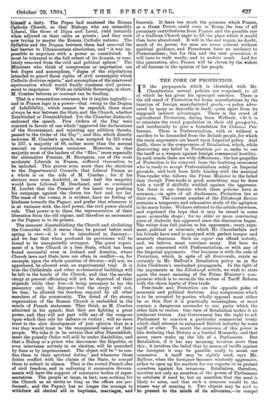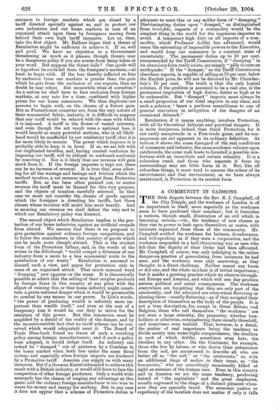I N the propaganda which is identified with Mr. Chamberlain several
policies are conjoined, to all of which he has given his episcopal sanction. There is the old creed of Protection for home manufactures by the taxation of foreign manufactured goods,—a policy advo- cated by many as desirable in itself, quite apart from its supposed indirect advantages. There is the creed of agricultural Protection, dating from Welbeck, n hi2h is to reinstate the rural population in their old prosperity, and incidentally to give a foundation for Colonial Pre- ference. There is Prefereutialism, with or without a sacrifice to be demanded from the British people, for which the main arguments are based upon Imperial policy. And lastly, there is the compromise of Retaliation, which, while disavowing any belief in Protection per se, seeks to use the tariff as a weapon against foreign commercial hostility. In such creeds there are wide differences ; the hot-gospeller of Protection is far removed from the doubting economist who is ready to accept Preferentialism solely on Imperial grounds ; and both have little kinship with the nominal Free-trader who follows the Prime Minister in the belief that though Free-trade is good, something may be done with a tariff if skilfully wielded against the aggressor. Yet there is one feature which these policies have in common,—in spite of all disclaimers, Protection lies at their core. The current number of the Edinburgh Review contains a temperate and exhaustive study of the agitation in its many forms. We have referred to the article elsewhere, and expressed the hope that it may be issued in some more accessible shape ; for no abler or more convincing piece of dialectic has appeared since the discussion began. The writer does full justice to his opponents ; every argu- ment, political or economic, which Mr. Chamberlain and his friends have used is analysed with perfect temper and masterly clearness. Such an expose can offend nobody, and, we believe, must convince many. But here we are not concerned with Preferentialism, or with any of the Imperial arguments. Our business is with the core of Protection, which, in spite of all disavowals, exists as certainly in Mr. Balfour's Retaliation policy as in Sir John Cockburn's unabashed propaganda. In the light of the arguments in the Edinburgh article, we wish to state again the exact meaning of the Prime Minister's com- promise which is to reconcile the wolves of Tariff Reform with the shorn lambs of Free-trade.
Free-trade and Protection are the opposite poles of economic and political doctrine. Any compromise which is to be accepted by parties wholly opposed must either be so thin that it is practically meaningless, or must contain a dangerous surrender to one party which the other fails to realise. One view of Retaliation makes it an irrelevant truism. Any Government has the right to ask Parliament to sanction a particular commercial treaty which shall attempt to safeguard British industry by some tariff or other. To assert the existence of this power is like declaring that Britain is a limited Monarchy, and that seven years make up the life of a Parliament. But Retaliation, if it has any meaning, involves more than this ; it involves the belief that by means of tariffs against the foreigner it may be possible really to assist our commerce. A tariff may be rightly used, says Mr. Balfour, when the foreigner becomes wantonly aggressive, either to open up his markets for our exports or to protect ourselves against his invasions. Retaliation, therefore, involves not only an assertion of the power of Parliament to retaliate if need be, but an assertion that the need is likely to arise, and that such a measure would be the wisest way of meeting it. Two objects may be said to be present to the minds of its advocates,—to compel entrance to foreign markets which are closed by a tariff directed specially against us, and to protect our own industries and our home markets in case of an organised attack upon them by foreigners issuing from behind their own high tariff ramparts. Let us, then, take the first object. Mr. Balfour hopes that a threat of Retaliation might be sufficient to achieve it. If so, well and good. We have no objection to a Government threatening as much as it pleases, though threats may be a dangerous policy if you are averse from being taken at your word. But suppose the threat fails ? Our goods will ex hypothesi be excluded from the foreigner's markets,—at least, to begin with. If the loss thereby inflicted on him by exclusion from our markets is greater than the gain which he gets from the exclusion of our exports, then no doubt he may relent. But meanwhile what of ourselves ? As a nation we shall have to face exclusion from foreign markets, at any rate for a time, combined with higher prices for our home consumers. We thus duplicate our sorrows to begin with, on the chance of a future gain. But as Protectionist countries are, from the very nature of their commercial fabric, inelastic, it is difficult to suppose that any tariff would be relaxed with the ease with which it is imposed. A tariff is the flower of vested interests, and even though the net result were a national loss, it would benefit so many powerful sections, who in all likeli- hood would be unaffected by our retaliatory tariff, that it is far more likely to remain. The power which imposes it is probably able to keep it in force. If so, we are left with our duplicated troubles, and, having created confusion by imposing our tariff, will be obliged to confound confusion by removing it. Nor is it likely that our revenue will gain much from it. If the foreign importer is kept out, there can be no increase of revenue. It is true that, even allow- ing for all the wastage and leakage and friction which the method involves, a net revenue may be got from Protective tariffs. But, as has been often pointed out, to secure revenue the tariff must be framed for this very purpose, and the objects of taxation carefully selected. In that case we must not consider the classes of goods against which the foreigner is directing his tariffs, but those classes whose taxation will mulct him most heavily. And in securing our revenue we shall defeat the very end to which our Retaliatory policy was directed.
The second object which Retaliation implies is the pro- tection of our home industries against an artificial crusade from abroad. We assume that there is no proposal to give protection against ordinary foreign competition, and to foster the manufacture in this country of goods which can be made more cheaply abroad. That is the crudest form of the Protection fallacy, and, in the words of the writer in the Edinburgh, " would compel a diversion of our industry from a more to a less economical route to the satisfaction of our wants." Retaliation is assumed to discard such a view, and argue for protection only in cases of an organised attack. That much misused word " dumping " now appears on the scene. It is theoretically possible to admit that the selling of their surplus products by foreign firms in this country at any price with the object of ruining this or that home industry might consti- tute a grave national danger which it would be permissible to combat by any means in our power. In List's words, " the power of producing wealth is infinitely more im- portant than wealth itself," and even at the cost of a temporary loss it would be our duty to strive for the retention of this power. But this concession must be amplified by a denial of the reality of the danger, and by the incontrovertible fact that no tariff scheme can be con- ceived which would adequately meet it. The Board of Trade Blue-book found no traces of such a wrecking policy among foreign manufacturers ; and if such a policy were adopted, it would defeat itself. An industry can indeed be " dumped " out of existence by a Combine in the home market when both live under the same fiscal system, and especially when foreign imports are hindered by a Protective tariff. America can supply us with many instances. But if a German Bartel attempted to achieve this result with a British industry, it would still have to face the competition of other foreign producers. Only a world-wide monopoly has the chance of reaping any advantage at this game, and the ordinary foreign manufacturer is too wise to waste his money and energy for nothing. But in any case it does not appear that a scheme of Protective duties is adequate to meet this or any milder form of " dumping." Discriminating duties upon " dumped," as distinguished. from bond-fide, imports of a commodity would be the simplest thing in the world for the ingenious importer to avoid. A temporary high duty on all imports of a com- modity, which Professor Ashley has advocated, would mean the entrusting of impossible powers to the Executive, and would keep our commerce in a constant state of uncertainty. The permanent duties up to 10 per cent. recommended by the Tariff Commission, if " dumping " in its obnoxious form really exists, are simply " pills to cure an earthquake." If the " dumper," as the Tariff Commission elsewhere reports, is capable of selling at 70 per cent. below the English price, be will not be deterred by Mr. Chamber- lain's 10 per cent. The truth is that the only logical solution, if the problem is assumed to be a real one, is the permanent imposition of high duties, duties so high as to be unbearable. But " dumped " imports must always be a small proportion of our total imports in any class, and such a solution " bears a perilous resemblance to one of general starvation in mitigation of the dangers of an occasional debauch."
Retaliation, if it means anything, involves Protection, with all its theoretical fallacies aad practical dangers. It is more dangerous, indeed, than frank Protection, for it can easily masquerade in a Free-trade guise, and its con- sequences are not apparent in its ordinary definition. At bottom it shows the same disregard of the real conditions of commerce and industry, the same academic reliance upon catchwords, the same rash haste to forestall a possible mis- fortune with an immediate and certain calamity. It is a colourless creed, and those who separate it from its surroundings may see little harm in it. But, like all colourless things, it must tend to assume the colour of its environment, and that environment, as we have always maintained, is Protection in its crudest form.



















































 Previous page
Previous page